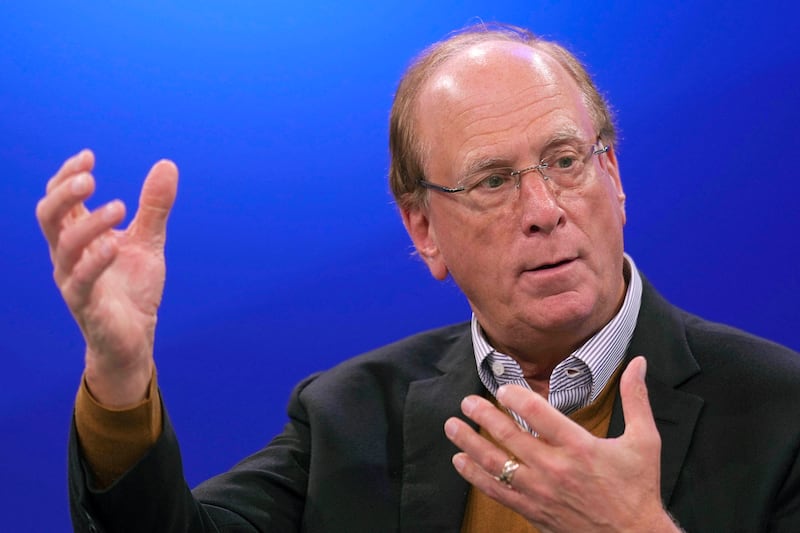TAIPEI, Taiwan – A coalition of 17 U.S. state attorneys general has raised concerns about major asset managers, including the world’s largest investment firm, BlackRock, playing down the risks of investing in China.
The attorneys general -- all Republicans -- accused BlackRock, JPMorgan, Goldman Sachs and other asset management companies of mischaracterizing China to their clients by failing to disclose it as a “foreign adversary” and omitting the risk of a Chinese invasion of Taiwan.
“We are particularly concerned about BlackRock’s material misstatements and omissions, as BlackRock is the largest issuer of emerging market ETFs and China ETFs,” the attorneys general said in a letter to the companies.
BlackRock is a leading global asset management firm, offering a range of investment and technology services to institutional and retail clients worldwide. As of January 2025, the firm managed approximately US$11.6 trillion in assets.
The attorneys general, including those from Montana, Alabama and Idaho, said in their letter that BlackRock implied that investing in China carried similar risks to investing in other countries, despite China being officially designated a U.S. foreign adversary in March 2023.
“Instead, prospectuses simply state that ‘strained’ relations between the U.S. and ‘Asia-Pacific issuers’ could create adverse effects,” they said, adding that the wording masked the significant differences between investing in a foreign adversary like China and a U.S. ally such as Japan.

The attorneys general also criticized BlackRock for misrepresenting forced labor and genocide of the Uyghur minority in the Xinjiang Uyghur Autonomous Region as “religious and nationalist disputes.”
“Other major asset managers such as State Street, Invesco, JPMorgan, Goldman Sachs, and Morgan Stanley (the ‘Other Asset Managers’) similarly misrepresent or conceal the material risks of Chinese investments,” they said.
BlackRock said in a post on X that the attorneys general were wrong about three of its particular disclosures on China: the threat of invasion to Taiwan, the risk of private property ownership in China and auditing practices in China.
“We are clear about the threat of invasion to China,” BlackRock said.
State Street and Invesco declined to comment. The other asset managers did not respond to requests for comment by Radio Free Asia by publication time.
Taiwan factor
The attorneys general also pointed out what they said was the failure of major asset firms to disclose the risks of a Chinese invasion of Taiwan.
They noted that while U.S. military officials had suggested that Chinese President Xi Jinping was preparing to invade Taiwan by 2027, BlackRock’s fund disclosures misleadingly portray China’s relationship with Taiwan as similar to relations it has with neighboring countries.
Taiwan regards itself as a sovereign nation with its own government, whereas Beijing sees it as a rebellious province that must eventually reunite with China, by force if necessary.
“BlackRock suggests that a conflict between China and ‘neighboring countries’ would create relatively minor economic risks such as ‘interest rate fluctuations,‘” the attorneys general said.
Some BlackRock funds highlight the risk of war between North and South Korea as the only example of conflict in Asia, they said. Even prospectuses that mention the possibility of conflict between China and Taiwan fail to acknowledge China’s stated intention to take control of the self-ruled island.
“BlackRock fails to disclose this risk of an invasion on the derivative positions in its funds with Chinese investments,” they said.
But BlackRock rejected the suggestion that it was not clear about the threat of an invasion of Taiwan and referred to the post on X.
“China has a complex territorial dispute regarding the sovereignty of Taiwan and has made threats of invasion; Taiwan-based companies and individuals are significant investors in China. Military conflict between China and Taiwan may adversely affect securities of Chinese issuers,” BlackRock said in the post.
The attorneys general also said a Morgan Stanley prospectus neglected to mention the possibility of a Taiwan invasion, China’s declared intent to take control of Taiwan or the severe impact such a conflict could have on the fund.
The attorneys general said that the misrepresentation primarily comes from the pressure China places on firms seeking access to Chinese investors.
For example, after BlackRock became the first company to receive approval from China in June 2021 to sell to Chinese investors, it recommended that its investors more than double their investments in China, even though the U.S. had designated China as a foreign adversary months ago.
In 2022, the Chinese government instructed JPMorgan’s research arm not to publish economic data that it labeled “politically sensitive financial information,” the attorneys general said.
They also suggested that misstatements in fund disclosures may have resulted from an inability to accurately investigate facts, due to interference and distortion by the Chinese Communist Party.
Last November, 20 state financial officers issued a joint statement calling on public pension fund fiduciaries to divest from China. Texas Gov. Greg Abbott also directed state agencies to divest from China as soon as possible.
Edited by Taejun Kang.
